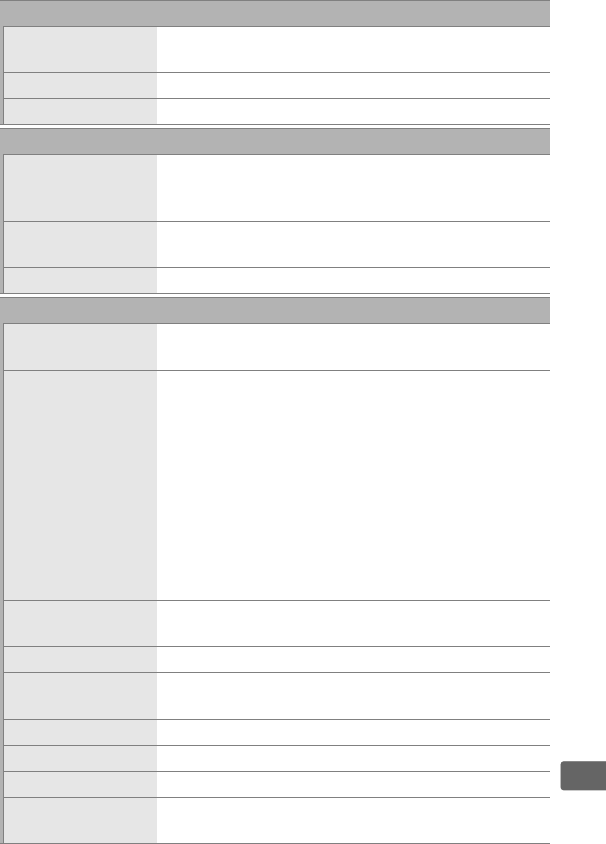
429
n
Shutter
Type Electronically-controlled vertical-travel focal-plane
shutter
Speed
1
/8000 – 30 s in steps of
1
/3,
1
/2, or 1 EV, bulb, X250
Flash sync speed X=
1
/250 s; synchronizes with shutter at
1
/250 s or slower
Release
Release mode S (single frame), CL (continuous low speed), CH
(continuous high speed), a (live view), E (self-timer),
M
UP (mirror up)
Frame advance rate •DX format (24×16): Up to 9 fps (CL) or 9–11 fps (CH)
•Other image areas: Up to 9 fps
Self-timer Can be selected from 2, 5, 10, and 20 s duration
Exposure
Metering TTL exposure metering using 1,005-segment RGB
sensor
Metering method •Matrix: 3D color matrix metering II (type G and D
lenses); color matrix metering II (other CPU lenses);
color matrix metering available with non-CPU lenses
if user provides lens data
•Center-weighted: Weight of 75% given to 8, 12, 15, or
20-mm circle in center of frame, or weighting based
on average of entire frame (non-CPU lenses use
12-mm circle or average of entire frame)
•Spot: Meters 4-mm circle (about 1.5% of frame)
centered on selected focus point (on center focus
point when non-CPU lens is used)
Range (ISO 100, f/1.4
lens, 20 °C/68 °F)
•Matrix or center-weighted metering: 0–20 EV
•Spot metering: 2–20 EV
Exposure meter coupling Combined CPU and AI
Exposure mode Programmed auto with flexible program (e); shutter-
priority auto (f); aperture priority auto (g); manual (h)
Exposure compensation –5 – +5 EV in increments of
1
/3,
1
/2, or 1 EV
Exposure bracketing 2–9 frames in steps of
1
/3,
1
/2,
2
/3, or 1 EV
Flash bracketing 2–9 frames in steps of
1
/3,
1
/2,
2
/3, or 1 EV
White balance
bracketing
2–9 frames in steps of 1, 2, or 3


















